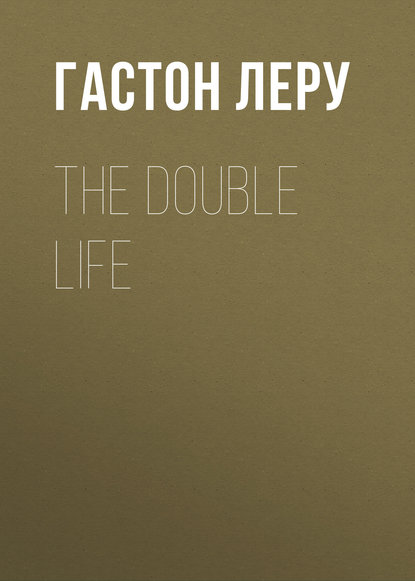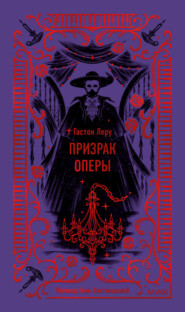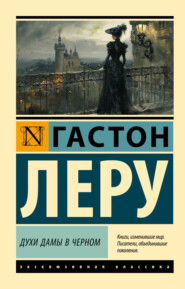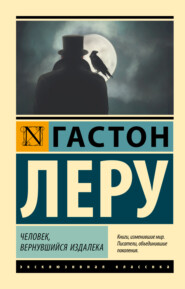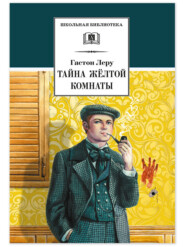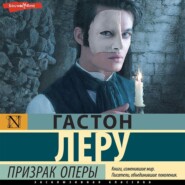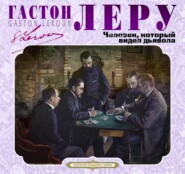По всем вопросам обращайтесь на: info@litportal.ru
(©) 2003-2024.
✖
The Double Life
Автор
Год написания книги
2018
Настройки чтения
Размер шрифта
Высота строк
Поля
CHAPTER II
An Explanation from Théophraste
NOW in reading the last chapter one would immediately think that M. Longuet had gone mad. What had possessed him? Where did he go? In order that you might fully understand his peculiar actions I will give you the extract from his memoirs relating to this incident. He writes:
I am a man of sound body and mind. I am a good citizen and recognize all the laws. I believe laws are necessary for the proper regulation of society. I dislike heartily any formalities, and in determining my lines of conduct I have always chosen the simplest way.
I dislike imaginative people, and the occult has always been repulsive to me. However, this is not through want of understanding, for my friend, Adolphe Lecamus, had given himself up to the study of spiritualism. Whoever teaches spiritualism teaches foolishness, and the desire to question the spirits of the dead by means of the planchette seems to me to be beyond belief, it is grotesque. However, I have assisted at some of Adolphe’s seances which he had given for the benefit of Marceline and myself. I have even taken a certain part in them, desiring to prove the absurdity of his theories. My wife and I once rested our hands on a table for a quarter of an hour waiting for it to move. Nothing happened, and we laughed heartily at him. However, my wife was more sympathetic, and was inclined to be a little more serious. Women are always more susceptible to the occult and ready to believe in the mysterious. Adolphe bought her books, which she read eagerly, and he amused himself sometimes by willing her to sleep, by making passes with his hands and breathing on her eyes. It seemed foolish, and I should not have allowed it from any one else, but I have always had a liking for Adolphe, and know that it amuses him. Marceline and he said that I was a skeptic. However, I am not a skeptic, as a skeptic is one who doubts all. I believe in progress, but do not believe that one person having an unnatural influence over another tends towards progress. Therefore I am not a skeptic, but rather a philosopher.
During his travels Adolphe read a great deal. I have had to work hard all my life, therefore, while he is an idealist, I am a materialist.
It seems necessary for me to thus describe my character so that it may be well understood that the happenings of the day before yesterday were not due to any occult reasons. I visited the prison in just the same manner as I would go to a store to buy a cravat. I wanted to learn, that is all. Having sold my business, I have more leisure, and so I said to myself: “I will visit the interesting places of the city of Paris.” Fate decreed that the Conciergerie was the first place to be visited. I do not know whether I really regret it.
At present I am calm and collected and can relate all I remember of what happened.
While we were in the Towers nothing happened worth recording. I remember trying to picture to myself in the little room which looked like a grocery store all the horrors of the place, how the executioners and their assistants approached the prisoners with their monstrous machines, how so many illustrious persons were martyred, and all the terrible griefs and agonies which had been witnessed within these walls. But the transformation had taken all the romance away, and the labels, “Senna,” “Hops,” etc., did not inspire imagination. Even the Bon Bee Tower, also called Bavarde, on account of the terrible cries which were heard in it, has been changed into offices. However, I must not complain. These are all the signs of progress and a more enlightened age.
But we penetrated into that part of the Conciergerie which has changed little during all these centuries, which had not been spoiled by the plasterer and in which all the stones could tell their own history; then it was that a most inexplicable fever took possession of me, and when we had reached the dark end of the walk of the “Straw Dealers,” I cried out from my soul, “Zounds! this is the walk of the Straw Dealers.”
I turned around immediately to find out who had uttered these words. They were all staring at me, and I was convinced that it was myself who had cried out. It seemed so strange. The voice was not like mine, but it had emanated from me. Even now it is unaccountable.
The Warden pretended that we had passed the walk of the “Straw Dealers.” I told him that I knew the place better than he, for I had lain there on the straw myself. But I had never been in the Conciergerie before, and yet I was sure of it. It is difficult to explain. While we walked through the chapel of the Girondists, and the Warden was explaining the story to us, I played with my umbrella. I tried to appear natural and collected. Although the things which happened were quite natural, and not the result of any effort, a cold perspiration seized me and I shook like a leaf. I remember that I found myself at the bottom of the stairs, standing before a grating. I was endowed with almost superhuman strength. Shaking the grating, I called out for the others to follow. However, the others had gone ahead and did not hear. I called to the Warden to open the grating. I don’t know what would have happened if he had not done so, quickly. I was crazy, and yet everything was natural to me. Truly, I was in a state of great nervous excitement, but everything was lucid to me. Never before had I seen so clearly as when in that dark cellar. Never before had I recognized a place so vividly as when I was down there where I had never been before. My God! I did not know them, and yet I recognized them.
Without hesitating I groped around, feeling the stones in the dark, and my feet trod a soil which seemed familiar but which had not been trodden for centuries. I seemed to know these very stones, forgotten in the darkness of those cellars. I slid the length of the damp flagstones as if I had been accustomed to the way. My finger-nails came in contact with sharp stones in the wall and I counted the seams as I passed. I knew that if I turned round I would see a certain square light in the distant gallery, a single ray in all this place where the sun had forgotten to shine since France’s history had begun. I turned and saw it, and I felt my heart beat violently.
Here there was a momentary interruption in the writings. M. Longuet, having explained what had happened to him in that strange hour in the Conciergerie, was greatly agitated. It was with difficulty he remained master of his thoughts. It was difficult to follow them; they seemed to come and go, just leaving faint traces on the paper of the record.
He resumed the pen with feverish hand. Continuing to busy himself with the subterranean passages, he writes:
It is necessary to pause here as one pauses at the edge of a precipice. My very thoughts make me shiver!…
And the Bavarde, there it stands. There are the walls which have helped to make history. It is not on high in the glorious sunlight that the Bavarde tells its history. It is here in the blackness of the earth. There are some large iron staples in the wall here. The very chains of Ravaillac! I recall no more; but towards that ray, the sole ray of light, as eternal and immovable as the very walls- towards that small square beam, which since the beginning of things has taken and kept the shape of a sentinel, I advanced. There was some impelling force which urged me on. I rushed ahead while the fever was in me and seemed to intoxicate me. Suddenly I paused, my feet seemed held to the ground and my fingers ran sliding and pressing the length of the wall. What it was that impelled my finger, what was the thought, I cannot tell. All at once I let my umbrella fall, and drawing my pen-knife, began to scrape steadily between two stones. The dust and cement powdered away easily, and soon my knife struck something between the stones, and I pulled the thing out.
This is why I am sure I was not mad. This thing has been before my eyes. In my most peaceful hours I, Théophraste Longuet, see it in my writing-desk. It is not I who am mad, but this thing itself! It is a piece of torn paper, stained. . . a document of which it is easy to tell the age and calculated to plunge any man into the deepest consternation.
The paper is, as you must know, terribly decayed. The dampness has eaten into half the words, which seem, on account of their reddish tint, to have been written with blood.
I took the document to the small ray of light, and on looking it over my hair seemed to stand on end with horror. There I could recognize my own handwriting, and I give you this precious and mysterious document clearly translated:
“Dead and buried all his treasures after the Treachery of April 1st. Go, take a look in the barroom! Look at the furnace! Look at the weathercock! Dig a while and you shall be rich!”
CHAPTER III
A Search and a Discovery
M. ADOLPHE LECAMUS and Marceline thought M. Théophraste’s actions strange, but they were too much occupied with an affair of their own to attach very great importance to them. However, M. Théophraste concealed his anxiety and pretended that the visit to the Conciergerie was quite a natural occurrence. He had gone down in the cellars just to satisfy a natural curiosity, not being one of those who make a superficial inspection of things of interest.
The following day, M. Théophraste, under the pretext of putting his affairs in order, shut himself up in his office and gave instructions for nobody to disturb him. Leaning over the balcony he looked out upon the little square of Anvers and reflected over the happenings of yesterday. There was nothing in the view to distract him. He was accustomed to the scene below: nurses pushing perambulators gossiping over the latest news, and a few professors walking towards the Rollie College. The Avenue Touraine rang with the shouts of college students who had come before the lecture hour.
Nothing had changed; the world was just the same. To-day, like yesterday, or like the day before yesterday. The people were going to their business just the same. Even Nidine Petito, the wife of the Italian professor, who lived in the apartment below, was the same. She began to play the “Carnival of Venice” on the piano just as she did every day.
Nothing had changed; thus he reflected. On turning round he could see amongst his papers on the desk, the document. Did it really exist? He had passed a restless night and was now attributing his strange adventure to a bad dream-but no, it could not be that, for there was the paper on his desk, in his own handwriting, and written in blood. Good God! perhaps it was his own blood. What thoughts, what thoughts!
Théophraste passed his hand over his forehead. He was perspiring and restless. Suddenly breathing a sigh and slapping his thigh with his hand, he appeared to have come to a definite resolution, and put the paper carefully away in his portfolio.
He remembered that Signor Petito, the Italian professor, was an expert in handwriting and that he had had experience in engraving. He would take the document to him and ask his opinion. His friend Adolphe was also interested in graphology, but only in a spiritual way, and so he would not confide in him. There was already too much mystery in the affair without mixing it up with spiritualism and mediums.
He had only known the professor to bow to on the stairs, and so in presenting himself he was introduced. The professor greeted him cordially, and after the usual formalities, Théophraste broached the subject of his visit. He produced the paper, and a letter which he had written some time previously. “Signor Petito,” he commenced, “having heard of your renown as an expert in handwriting, I would be grateful to you if you would examine this letter, and this document, and give me the result of your observations. I may say that there is no connection between the two papers.”
Théophraste was not in the habit of lying, and blushed redder than a peony. But Signor Petito was already deeply engrossed in the examining of the two papers. His scholarly eye looked over one, then the other. He placed them together, held them up to the light, passed his hand over the writing, and measured them. Then he laughed, showing his white teeth.
“Monsieur Longuet,” said he, “it is not necessary for me to keep you waiting long for a reply. This document is in a very bad condition, but the specimen of handwriting can still be read. They are in every way similar to the letter, and I would swear before any tribunal that those two handwritings have been traced by the same hand.”
Then he entered into details. “A child,” he said, “could not be mistaken about it.” He pointed out how this duplicate writing was identically angular. “We call a handwriting angular, Monsieur, when the hair-strokes which join the bottom of the letters and the separate letters are at an acute angle to the down-strokes of the letters. Do you understand? Compare this hook and that one, those hair-strokes with these others, and all those letters getting larger, larger in both writing and in equal measure. But what a clear writing, Monsieur; I have never seen such clear writing before. As clear as if cut with a knife.”
By this time Théophraste had become white with nervousness. Signor Petito thought that he was going to faint. However, he arose, picked up the document and the letter, and having thanked Signor Petito, he went out.
He wandered the streets for a long time, and at last turning down a small street, he stood in front of an old door in the Rue Inger. Entering, he found himself in a narrow, dark passage. A man came out of a back room, and on recognizing Théophraste, greeted him in a friendly way. He was wearing a square paper cap, and had on a black gown which reached down to his feet.
“Good-day, Théophraste, good-day. What happy chance has brought you here?”
As it had been two years since they had last seen each other they at first spoke of family matters and other generalities. Ambrose spoke of his trade of engraving visiting cards. He had been a printer. He had been a printer in the province, but having put all he had into an invention for a new paper, he had failed. He was a distant cousin to Marceline, and when he was deep in financial troubles, Théophraste had come to his rescue.
Théophraste seated himself on the wicker chair in the small room which served as a workshop. This room was lighted by a large window reaching from floor to ceiling.
“Ambrose, you are an expert. No one can approach you in the knowledge of papers, eh?” “That is not quite true,” said Ambrose, “but I can judge a good paper.”
“You understand all kinds?”
“All kinds.”
“If some one showed you a piece of paper, could you tell the age of it?”
“Yes,” said Ambrose, “I could. I have published a treatise on the water-marks of papers used in France in the seventeenth and eighteenth centuries. That study was accepted by the Academy.” “I know, and I have great respect for your knowledge.”
“Well, the thing is simple. The oldest paper showed a plain, glossy surface, but soon there appeared wide lines crossed at intervals by perpendicular lines, both giving the impression of a metal trellis over which the paste had been spread. From the fourteenth century they used these as a maker’s mark, and in the end they designed figures in brass wire, initials, words, emblems of all sorts -these are the water-marks. Every sheet of water-marked paper tells its tale, and the year of its make can be detected, but the difficulty is to decipher it. This necessitates a little practice.” Théophraste opened his portfolio and took out the paper.
“Can you tell me the exact date of this?” Ambrose put on his eyeglass and took the paper to the daylight.
“There is the date,” he said, “172—, the last figure is rubbed out. It must be of the eighteenth century.”
“Oh,” said Théophraste, “I saw that date quite well, but do you really think that the paper is-of that century? Does not the date lie? That is what I want to know.”
Ambrose showed him the center of the paper. “See?”
Théophraste said nothing. Then Ambrose lit a small lamp and held the paper up before it. In illuminating the document one could detect in the thickness of the paper the design of a crown.
“Théophraste,” said Ambrose excitedly, “that paper is exceedingly rare. That mark is almost unknown, for a very little paper was made with that sign, which is called the Crown of Thorns. That paper, my dear Théophraste, was made in 1721.”





